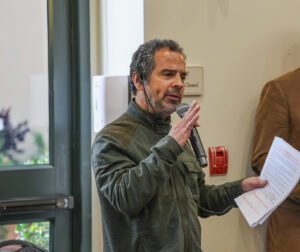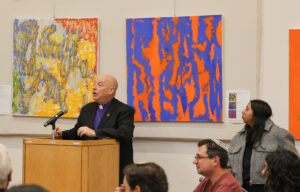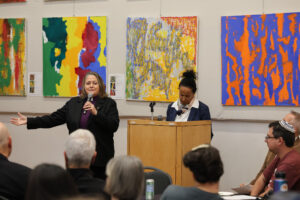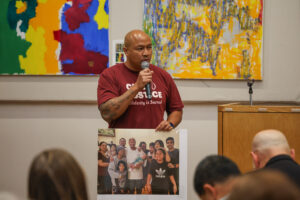
Guillermo Torres, immigration program director at CLUE Justice and a forum organizer, speaks at the event
Immigration organizers, interfaith leaders, and others met Sunday, Dec. 8, to discuss immigration justice and strategies for the coming year, at a solidarity forum organized by Clergy and Laity United for Economic Justice (CLUE Justice) and the Episcopal Diocese of Los Angeles, held at St. Paul’s Commons, with more than 100 in attendance.
The forum comes in the wake of President-elect Donald Trump’s promises of mass deportation. In his remarks opening the event Bishop John Harvey Taylor said it’s uncertain if Trump really means what he says, or if it’s just a tactic to get power, but that this anti-immigrant rhetoric is a cause for fear for immigrants, especially those without status, and for the nation as a whole.
“This isn’t a partisan event,” Taylor said. “This is a place of preparation, that we might be ready for whatever work God invites us to undertake in the months and years ahead. The only side we’re taking is the side of those who may be at risk as a result of the unjust actions by a government that’s supposed to be pledged to the all-American values of truth and justice and liberty for all.”
Bishop Dottie Escobedo-Frank, resident bishop of the Los Angeles area for the California Pacific Conference of the United Methodist Church lead a reflection on part of the 25th chapter of the Gospel of Matthew: “I was a stranger and you invited me in, I needed clothes and you clothed me, I was sick and you looked after me, I was in prison and you came to visit me…whatever you did for one of the least of these brothers and sisters of mine, you did for me.”
“We’re at this moment where we have to do what’s important, to care for our neighbors,” Escobedo-Frank said. “And we have to have the strength to live into the connection that God gave us.”
“This is a moment when the church must speak out,” Escobedo-Frank continued. “We will be told to keep our voices to ourself or whisper within our families and neighborhoods. But I want to say, ‘Don’t whisper. Shout from the rooftops that God is love and that we follow our way of faith.'”
In an open discussion, attendees discussed past policies that had harmed the community, and the fear of similar policies being reinstated or enacted, including the family separation, or “zero tolerance” policy, in which over 5,500 children were separated from their parents at the border; the Muslim travel ban and suspension of resettlement of all Syrian refugees; and an attempt during the first Trump administration to end the Deferred Action for Child Arrivals (DACA) program.
With the harm done by these policies to the immigrant community came also support and solidarity. The group followed these harmful policies with inspiring actions undertaken during that time by community members. Guillermo Torres, immigration program director at CLUE Justice and one of the organizers of the forum, shared that during this time, CLUE Justice helped to organize rapid response networks in Los Angeles, began a detainee visitation program at the Adelanto ICE processing center, and helped to initiate several lawsuits that saw hundreds of detainees released.
Coalition for Humane Immigrant Rights of Los Angeles (CHIRLA) gave out cards stating in English and Spanish an individual’s right to remain silent and contact an attorney or organization prior to questioning. CHIRLA invited congregations to distribute these cards among their parishioners.
Sithy Bin, a faith-rooted organizer with CLUE Justice, shared his personal experience with immigration detention in a call to organize and stand with him, and others at risk of deportation. Bin has been working with CLUE Justice since 2020, after his release from an Immigration and Customs Enforcement (ICE) detention center. Bin and Laura Hernandez, Freedom for Immigrants (https://www.freedomforimmigrants.org/laura-hernandez) executive director, both formerly-incarcerated immigrants, are campaigning for pardon by Governor Gavin Newsom to avoid the possibility of deportation. Links to their campaigns are here.
To conclude the meeting, the discussion turned to next steps, and what the faith community can do to support immigrant neighbors. Many congregations are reaffirming or adopting their status as “sanctuary churches,” and exploring the ways in which they can support immigrants, including providing physical sanctuary, or getting involved with rapid response networks. With the reconvening of the Episcopal Diocese of Los Angeles Sanctuary Task Force, also known as Sacred Resistance, the diocese will help organize and inform churches and individuals as they seek to support and stand with immigrants.
The Rev. Greg Kimura and the Rev. Mark Hallahan closed out the meeting with a “sacred resistance and sanctuary” pledge for action in solidarity with immigrants, with actions including:
- Connecting with the National Sanctuary Movement(https://www.facebook.com/nationalsanctuarymovement/), as a congregation or organization
- Providing physical sanctuary, as a congregation
- Offering logistical support for those in sanctuary in other congregations
- Being trained on prosecutorial discretion packets to help immigrants prior to court cases
- Being trained to accompany immigrants to ICE check-ins and visit immigrants in detention
- Supporting federal legislative reforms for a more just immigration system
- Writing articles or spreading the word, to encourage others to take action
- Attending acts of public witness or civil disobedience to resist ICE raids and discriminatory actions
For more information on the Sanctuary Task Force, and how to get involved, contact Kimura at fathergreg@sjcsp.org, or Rev. Jamie Edwards-Acton at hopeinholywood@gmail.com. Sign up for action alerts from CLUE Justice here.



